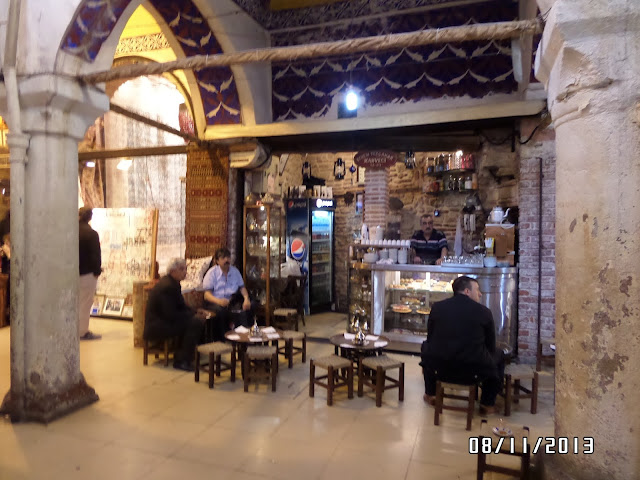因為我是一個不喜歡購物的窮鬼背包客,所以平時盡可能避開紀念品店。一來我沒有很多的多餘錢,二來我討厭亦不懂殺價,三來就算買了紀念品我的背包也放不下。所以對這個大巴扎(旅遊書上說它是世上最大的巴扎,而我就把它自動譯成「世上最大的紀念品店」),抱著一絲抗拒但好奇的態度去「見識」一下。
I’m a
poor backpacker; therefore I tend to avoid souvenir shops. Firstly I just don’t have this money. Secondly, I hate and suck at haggling. Thirdly, even if I’ve bought something,
chances are it’d be too big for my small backpack. Therefore, I held some “healthy skepticism”
and curiosity to see if this Grand Bazaar (guide book says it’s the biggest
bazaar in the world, I automatically translate it to “the biggest souvenir shop
in the world”) going to be an eye opener for me.
這個世上最大的巴扎,是卾圖曼土耳其人在征服君士坦丁堡,由蘇丹穆罕默德二世開始興建的。剛剛開始的時候只是一個布料市場,後來加入了其他的首飾,陶瓷,香料,地毯等市場,而街道上亦建了天頂(由最初的布天頂到後來的磚瓦天頂)。
This the
world’s biggest bazaar was started by Mehmet II when Ottoman Turks conquered Constantinople. It began as a
textile bazaar, and later became a bazaar mixed with other trades, such as, jewellery,
pottery, spices and rugs. Later roofs
were being put up over the streets to make it one large structure (canvas, then
wood, then brick).
「大巴扎迷宮」/ “The maze of Grand Bazaar”
由舊城區步行到大巴扎只需要太約二十分鐘左右,或搭四至五個站的輕鐵(捷運)列車。我沿著列車路線行到大巴扎輕鐵(捷運)站,雖然知道大巴扎有十數個出入口,但我就是找不到任何指向大巴扎的路牌。後來才想到可能因為有十數個出入口才沒有路牌,結果要問當地人才找到入口,然後又要擺脫那些「來我家店鋪喝杯茶」的推銷手段才正式見到大巴扎。
It takes roughly 20 minutes to walk to Grand Bazaar
from the old town, or 4-5 stops on the metro.
I walked along the metro line to the Grand Bazaar stop, and couldn’t
find any road sign for the Grand Bazaar, despite it has got over 10
entrances. It came to me later that
perhaps that’s why there’s no sign posting, it’d be far too confusing for
people. In the end, I had to ask some
locals for direction, and got the usual ‘come into my shop to have a cup of
tea’ sale tactic in return.
我自認方向感一向都不錯,但在一段段差不多的窄巷中穿插,五分鐘,我已經向大巴扎投降。我對自己說「與其花精神去確定自己的位置,不如由隨緣地去見識一下土耳其的特色商品吧」。然後抬一看,見到了一些關於大巴扎歷史的介紹牌,算是一個意外的收穫。
I have always thought I have a
rather good sense of direction, but all it took was 5 minutes walking through
the alleyways in Grand Bazaar to defeat me.
I told myself ‘rather than making effort to locate myself, I might as
well let fate to take me where I’m going’.
I accidently looked up and saw some signs hanging from the ceiling
telling people about Grand Bazaar’s history.
What a nice find.
大巴扎裹大部份的商店果然都是賣紀念品的,土耳其燈、瓷器(碗碟)、水煙、地毯、布料,林林種種,多不勝數。在大巴扎的中心地區,還有一個金器首飾和古董市場。
As expected, most of the shops are souvenir shops,
Turkish lamps, porcelain, hookah, rug, and textile, so on. There’s even a gold and antique market in the
central area of the Grand Bazaar.
有一點意外的是大部份的店主就在店門和其他的店主說話,我走進去看他們都無甚反應,可能是因為我不是一個女生吧。說起上來這也算是性別歧視的一種吧,土耳其男人好像很喜歡叫外國女生(非土耳其)做美女,對她們說我愛你,問她們做女朋友。還有他們很喜歡攬膊頭(肩頭)和攬腰,我認為那是「抽水」的表現。
I was somewhat surprised that most of the shop
owners stayed in front of their shops talking to other shop owners, never paid
much attention to me when I looked through their merchandises, perhaps it’s
because I’m not a girl. It seems that
Turkish men like to call foreign women pretty or beautiful, tell them “I love
you” and ask them to be their girlfriends.
They also like to put their hands around their shoulders or waist;
personally I think it’s gross and it’s disrespectful to women.
「土耳其咖啡」和「雀巢咖啡」的分別 /
The difference between “Turkish coffee” and “Nescafé”
在大巴扎亂逛了大約一小時,肚子已經開始向我抗議。我在想,我的一天才開始,怎麼又想吃東西了?我想到兩個可能,一就是「我係飯桶(吃貨)」,二就是「鳩嗚(購物)」是一種超耗能量的活動,而第三個可能就是上述兩種可能都是成立的。所以,當我經過大巴扎內的咖啡店區的時候,決定坐下來休息一下。
After roaming inside the Grand Bazaar for about an
hour, my stomach started to grumble. I
thought, the day has only just begun, why am I hungry again? I thought of two possibilities. One, I just can’t stop eating; two, “shopping”
is an exhausting activity. Of course
there is a third possibility, that is both first and second possibilities are
true. So I decided to stop by one of the
café inside the Grand Bazaar.
在喝了幾天cay(土耳其語:茶)之後,決定今天嘗試一下土耳其出名的土耳其咖啡。我坐下來之後向侍應生說我要coffee,然後在他的介紹下點了一種叫baklava的甜點。侍應生跟著問我coffee要不要milk?我想怎麼問我要不要milk這種怪問題,土耳其咖啡當然是不要milk,所以我說No, thank you。
當他數分鐘後帶了一杯大大的,黑黑的飲料回來,我還在想那是什麼,侍應生已經說:「先生,你的Nescafé。」我想我呆了近十秒,然後指向鄰卓在喝土耳其咖啡的歐洲夫婦說:「我要的是那種咖啡。」 侍應生說:「那你應該在order時說Turkish coffee⋯⋯」我:「⋯⋯」。最後,當然是把那一大杯難喝又沒有奶的Nescafé 喝掉(浪費是可恥的⋯⋯)。這算得上是小小而又難得的一課。
After drinking cay (Turkish for tea) for several
days, I decided to try out the famous Turkish coffee. I told the waiter I wanted coffee and ordered something called “baklava” under the recommendation from the waiter. Then the waiter asked me whether I wanted
milk in the coffee? I thought, what a
strange question, of course no milk in Turkish coffee, so I said ‘No, thank
you.’
Several minutes later, he came back with a large
cup of black drink, I was still trying to work out what that was, he’d already
said: ‘Here is your Nescafé.’ I was
stunned for about ten seconds, then pointed to the European couple sitting next
to me who were drinking Turkish coffee, said ‘That’s the coffee I want.’ He then said ‘Then you should’ve ordered
Turkish coffee.’ I was totally
speechless. Of course, in the end, I
drank that horrible black coffee, since I was going to pay for it, I wasn’t
going to let it wasted… I think that’s a
lesson learnt.
最後讓我介紹一下baklava這種甜點。原來它是一種在中東很出名甜點。它是一種口味濃郁、甜膩的酥皮點心。果仁蜜餅以層層酥皮製成,內餡裹入碎堅果,再搭上甜蜜的糖漿或蜂蜜,是阿拉伯、伊朗國家與從前的鄂圖曼等地區常見的菜餚(來源:維基百科)。
我已經不太紀得起它的味道,我只記得它就像一個很甜很甜的义燒酥,總括來說就只有一個字:「甜」!事實上我當日只吃了兩件,最後一件怎麼也吃不下。真是不知道土耳其人(或者應該說中東人)是怎麼享受這個甜點的。
Let me talk a little about baklava. It is a Middle Eastern dessert. It is a rich,
sweet pastry made of layers of filo filled with chopped nuts and sweetened and
held together with syrup or honey (Source: Wikipedia).
To be honest, I don’t really remember what it
really tasted like, but I can sum it up in one word: SWEET! It’s so sweet that I only managed to eat 2 of
those that day, and became slightly nauseous when I thought about finishing the
last one. I really have no idea how the
Turks (or Middle Eastern people in general) enjoy this.















